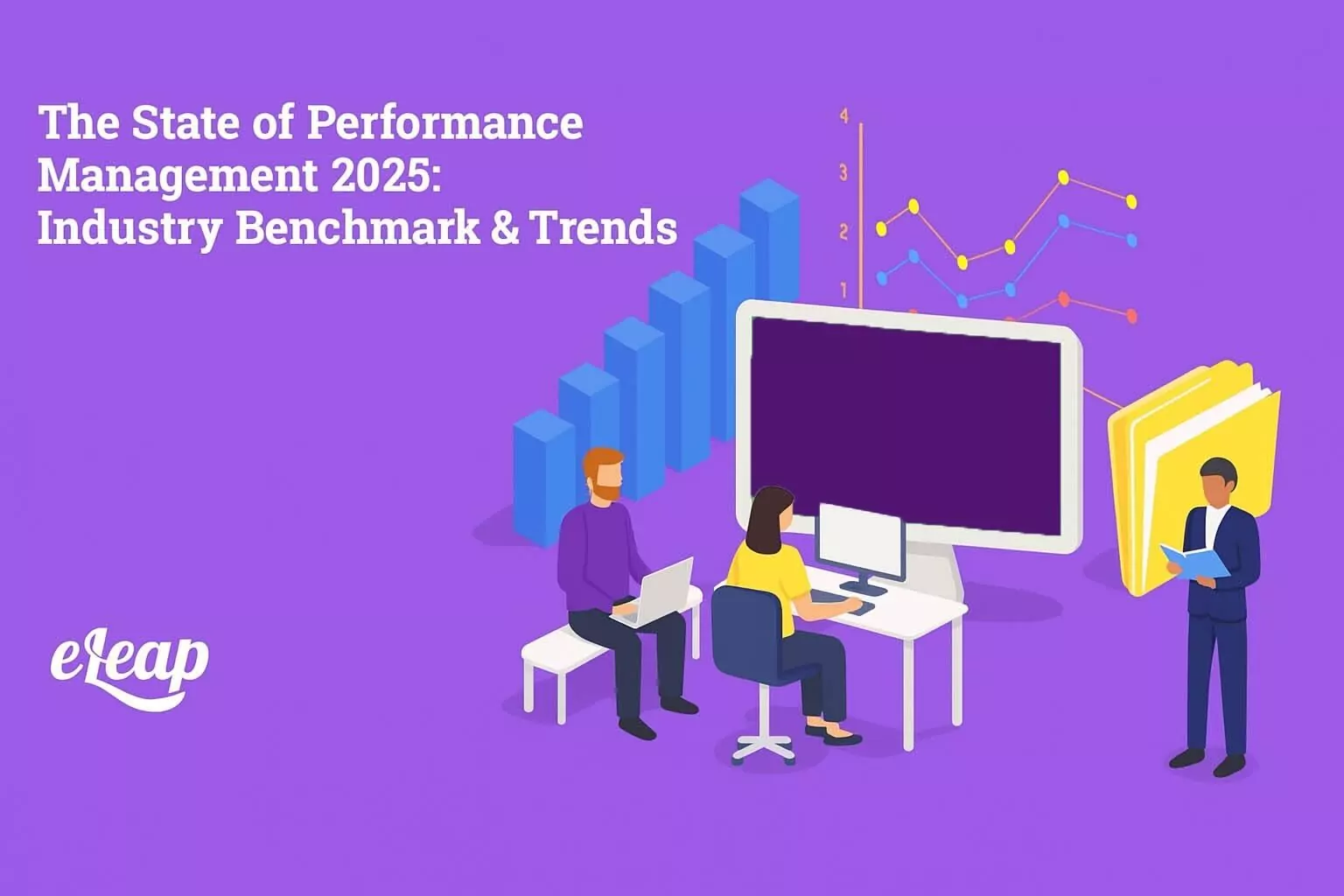The State of Performance Management 2025: Industry Benchmarks & Trends
Industry Benchmarks & Trends: Comprehensive Analysis of Performance Management Evolution, Technology Adoption, and Workforce Dynamics

The traditional model of annual performance reviews is rapidly becoming obsolete. With 41% of organizations already implementing continuous feedback systems that deliver measurable business results, the performance management landscape is experiencing its most significant evolution in decades.
This comprehensive whitepaper presents groundbreaking research findings on current industry benchmarks, adoption trends, and the measurable business impact of modern performance management practices across organizations of all sizes.
Key Statistics:
- 41% Organizations using continuous feedback systems
- 44% Better talent retention rates compared to traditional models
- 340% ROI within 18 months of implementation
22-Page Research Report Get instant access to comprehensive industry data, benchmarks, and actionable insights that are reshaping how organizations approach performance management.
Executive Summary
Organizations worldwide are abandoning annual performance reviews at an unprecedented rate, with research showing that companies implementing continuous feedback systems achieve significantly better business outcomes. This whitepaper synthesizes data from leading HR research organizations, industry surveys, and academic studies to provide actionable insights for HR leaders navigating this critical transformation.
Key findings reveal that modern performance management practices deliver:
- 39% better talent attraction rates
- 44% improved retention compared to traditional annual review models
- Average ROI ranges from 180% to 340% within the first 18 months
- 14.9% lower turnover rates for employees receiving regular feedback

Key Research Findings
Discover the data-driven insights transforming how organizations manage performance and engage employees across five critical dimensions.
The Shift from Annual Reviews to Continuous Feedback
- 39% Greater effectiveness in talent attraction with continuous feedback systems
- 22% of employees experience emotional distress following traditional performance reviews
- 37% actively seek new employment as a direct result of annual review processes
- 41% of organizations have already shifted toward frequent one-on-one meetings
Performance Management ROI Across Company Sizes
Small Organizations (Under 100 Employees):
- Implementation costs: $15,000 – $45,000 annually
- 23% reduction in voluntary turnover rates
- 31% improvement in employee engagement scores
- 18% increase in productivity metrics
- 27% reduction in time-to-competency for new hires
Mid-Size Organizations (100-1,000 Employees):
- Implementation costs: $75,000 – $200,000 annually
- 19% reduction in employee turnover
- 34% improvement in manager effectiveness ratings
- 25% increase in goal achievement rates
- 29% improvement in career development satisfaction
Large Organizations (1,000+ Employees):
- Implementation costs: $300,000 – $1.5 million annually
- 15% reduction in overall turnover (significant absolute savings)
- 28% improvement in cross-departmental collaboration
- 21% increase in leadership development effectiveness
- 33% improvement in succession planning readiness
Technology Adoption and AI Integration
- 92.1% of companies report positive returns on AI investments in performance management
- 75% mobile adoption rates among millennial and Gen Z workforces
- 42% reduction in administrative time with comprehensive automation
- 28% improvement in manager decision-making quality with AI-driven insights
- 35% reduction in bias-related discrepancies in evaluations
Generational Workplace Preferences
- 30% of workforce will be Gen Z by 2030, requiring new feedback approaches
- Generation Z: Prefer immediate, digital-first feedback through mobile platforms
- Millennials: Value structured development conversations with clear career progression
- Generation X: Prefer documented performance discussions with formal evaluation criteria
- 31% higher satisfaction rates with multi-modal feedback systems across all generations
Manager Effectiveness and Retention Impact
- 67% Lower voluntary turnover rates for direct reports of highly effective managers
- 34% Higher manager effectiveness scores with peer coaching programs
- 47% Higher engagement rates with multi-channel communication strategies
- 28% Average retention improvement across all employee levels with quality performance management
What You’ll Learn
Comprehensive insights across seven critical dimensions of modern performance management transformation.
1. Annual Review Frequency vs. Continuous Feedback Adoption
Detailed analysis of the decline of traditional annual reviews and the accelerating adoption of continuous feedback systems. Learn why Adobe’s revolutionary approach eliminated annual reviews entirely and how other organizations are following suit. Understand implementation patterns by organization size and regional variations across technology, financial services, and healthcare industries.
2. Performance Management ROI Statistics Across Company Sizes
Quantified return on investment data for small, medium, and large organizations with specific cost-benefit analysis frameworks. Discover why small organizations achieve the highest proportional returns while large enterprises realize the greatest absolute financial impact. Includes detailed breakdown of technology, training, and administrative costs versus measurable benefits.
3. Technology Adoption Trends: AI, Automation, and Mobile-First Solutions
Comprehensive examination of artificial intelligence integration in performance management, including predictive analytics for identifying high-potential employees and natural language processing for feedback sentiment analysis. Learn about machine learning applications, mobile-first platform requirements, and automation capabilities that reduce administrative overhead by up to 42%.
4. Generational Differences in Feedback Preferences
In-depth analysis of how Generation Z, Millennials, Generation X, and Baby Boomers prefer different communication styles, feedback frequencies, and performance management approaches. Understand cross-generational integration strategies and communication style adaptations that maximize engagement across all demographic groups.
5. Correlation Between Performance Management and Employee Retention
Proven statistical relationships between performance management quality and retention rates across industries and organizational sizes. Detailed examination of manager effectiveness as the strongest predictor of employee retention, with specific strategies for improving manager development and coaching capabilities.
6. Implementation Recommendations and Best Practices
Structured three-phase implementation approach spanning 12-18 months, including technology platform selection frameworks, change management methodologies, and risk mitigation strategies. Comprehensive manager development programs, cultural integration techniques, and success measurement frameworks.
7. Future Trends and Predictions
Emerging technology integration, including virtual reality training simulations, blockchain-based credentialing, and personalized adaptive systems. Analysis of global and remote work adaptations, continuous learning integration, and the convergence of performance management with broader talent development strategies.
Ready to Transform Your Performance Management?
Join thousands of HR leaders using these insights to drive organizational excellence.
The data clearly demonstrates that organizations implementing modern performance management practices gain significant competitive advantages in talent attraction, retention, and overall business performance.


